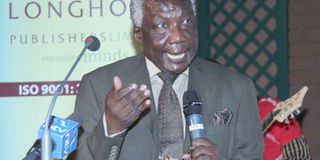Why it is important to get our facts right before placing them in the public domain

Veteran journalist Philip Ochieng writes a social-political column in the Sunday Nation. It has been intimated that Ochieng's article published in the Sunday Nation of October 25, 2015 might have had inaccurate information. Fact-checking is usually important. PHOTO | CHARLES KAMAU | NATION MEDIA GROUP
What you need to know:
- The poem began, “What a friend we have in Jesus, all our sins and griefs to bear! What a privilege to carry everything to God in prayer!”
- Apart from one-man fact-checking outfits such as Mwangi Kibaka’s, there are fact-checking organisations that verify statements made publicly by politicians and journalists.
- There is even a fact-checking organisation for Africa, Africa Check, set up in 2012 to promote accuracy in public debate and the media.
Who wrote the Christian song, "What a Friend We Have in Jesus?"
When? The song was composed by a “pious” European slave nyapara upon returning to his cabin just after he had ordered hundreds of starving African captives to be thrown into a shark-infested sea, according to Philip Ochieng in his article, "You cannot fool God, even with your fake prayers", published in the Sunday Nation of October 25.
He made that statement in the process of pooh-poohing the Jubilee coalition leaders’ prayer rallies for the ICC-besieged William Ruto and Joshua arap Sang.
God will not ignore the teeth-gnashing of those who lost their children, parents, homes and property during Kenya’s post-election mayhem, he wrote.
The idea that God will listen to the prayers of those suspected to have perpetrated it should be rejected, he concluded.
It seems obvious, he said, that if you committed the election crimes then no amount of mere prayer will ever move God to your side.
Mwangi Kibaka, who sends me almost daily questions on “true-or-false statements”, wisely chose not to go down the rabbit hole of what is the meaning and purpose of prayer.
Instead, he chose to fact-check the assertion that the world-famous hymn was written by a white slave trader shortly after he ordered hundreds of starving African captives to be thrown into a shark-infested sea.
FACT-CHECKING
Mr Mwangi — who also religiously completes the crossword in the Daily Nation and woe betide us if we make any mistake — called me on Wednesday morning to say the song was actually written in 1855 by Joseph Scriven, a grief-stricken Christian who migrated to Canada from Ireland.
It was while he was in Canada that he was informed that his mother was ill.
He could not afford to return to Ireland, so he sent her a poem to comfort her.
The poem began, “What a friend we have in Jesus, all our sins and griefs to bear! What a privilege to carry everything to God in prayer!”
In the 1880s, the 193-word poem was published in a book of hymns and became one of the most popular songs.
Its lyrics make people feel that faith can triumph over grief.
The song was brought to Africa by missionaries. I counter-checked Mr Mwangi’s findings.
I could not find any references to a European slave nyapara as the composer of the song.
Was Philip Ochieng creating an urban legend?
It is becoming increasingly difficult to get away with misinformation.
Apart from one-man fact-checking outfits such as Mwangi Kibaka’s, there are fact-checking organisations that verify statements made publicly by politicians and journalists.
VARIOUS WEBSITES
The fact-checkers separate facts from fiction, false beliefs, urban legends, folklore, myths, rumours, and other misinformation.
There are several websites, such as FactCheck.org, that specialise in fact-checking.
There is even a fact-checking organisation for Africa, Africa Check, set up in 2012 to promote accuracy in public debate and the media.
With offices in Johannesburg, Dakar, and London, it tests claims made by public figures, institutions, and the media against the best available evidence.
Kofi Annan, former UN secretary-general, said Africa Check is good for democracy.
For people to make informed decisions, he said, the claims made in the public domain must be held up to scrutiny.
The issue of who wrote "What a Friend We Have in Jesus" may not seem so critical, but it is indicative of the importance of accurate information in public discourse.
Is it true, for example, that Bungoma County was taken for a ride buying stainless steel wheelbarrows at Sh109,320 apiece or that 41 per cent of South African college students are HIV-positive?
KENYA CHECK
Those are some of the claims Africa Check has looked into, in some cases with surprising results.
We are bombarded daily with unverified information.
Is it true, for example, that the house that William Ruto is building in Uasin Gishu costs Sh1.2 billion or that Jubilee operatives have made a Sh34 billion profit trading with government money, or that Kiambu County has spent Sh50 million on neurosurgery unit that does not exist?
Mwangi Kibaka, the one-man fact-checker who also operates a bar at Ndunyu Chege in Gatanga, Murang’a, cannot cope with all the fact-checking.
We need, as country, our own Kenya Check.




